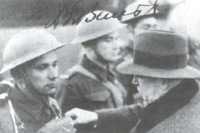
I normally listen to BBC World Service radio in the morning whilst getting ready to go to work. I often hear things that grab my attention, but by the time I am at a computer and ready to do some research and write about them, I have forgotten what they were.
This happened yesterday or the day before, when I listened to a US ambassador being interviewed, and what he was saying and how he was saying it really rubbed me the wrong way. By the time I was ready to write about it, all I could remember was that either his first or last name was William(s), he was ambassador in a Latin American country (no idea which one) and he was talking about the “war on drugs” in a manner that was really condescending and patronising towards the government and the people of whichever country he was ambassador to. I made a perfunctory effort to find a US ambassador called William(s) in a Latin American country, but then I just gave up.
So today I made a real effort to remember things - for example, scratching the word Texas into my arm with my fingernail while I was in the shower. It worked because I can now recall 4 things from this morning’s news that upset me (aside from the mess with Arsenal and that Belgian football club).
I am not going to write about one of them, which was the revelation of another possible My Lai style massacre in addition to Haditha. As I discussed with my contact in a major media enterprise yesterday, that certainly deserves its very own post and I am currently negotiating with said contact for a guest blog.
Instead I am looking to the land of the free and the home of the brave - The America.
First stop, new New Orleans or, more specifically, the Renaissance Trailer Park, which houses 2,500 or so former residents of New Orleans. The BBC went there and interviewed some “temporary” trailer park people. FEMA erected the trailer park on the grounds of a juvenile correctional facility or, as the BBC interviewer translated it for a worldwide audience, a youth prison. The trailers are small, but FEMA has furnished all of them with large colour televisions – the opiate of the masses. I couldn’t see on the radio, but I would guess that the majority, if not all, of the trailer park’s residents are black, and it doesn’t seem like anyone is making any effort to get them out of there and back into real homes. That last part is conjecture, based only on what I heard in the interviews. I will not say that it is the government’s responsibility to get the trailer park people back into real homes, but the trailer park people seem to be waiting for the government to do something. Therefore, the least the government should do is to communicate with them and let them know they are waiting for something that is not going to happen so that they will know that they should start making things happen on their own.
Second stop, the border between Texas and Mexico. The state of Texas announced yesterday that it is planning to install hundreds of video surveillance cameras along its border with Mexico. The video footage will be broadcast live on the internet so anyone anywhere can fulfil his or her fantasy of being a border policeman/woman. Governor Rick Perry sees his plan “as no different than the neighbourhood watches that we’ve had in our communities for years and years.” But I see it more as a “spy on your neighbour” scheme, a “be a good citizen and be the eyes and ears of the police state” programme. The Electronic Surveillance Curtain – the new and improved 21st century Iron Curtain.
And the final stop for today, my home state of California. Muscle-boy Governor Arnold Schwarzenegger has given in to the fascists in Washington and has agreed to send the California National Guard to the border with Mexico. The four southern border states will be signing a Memorandum of Understanding with the DC dictatorship which includes provisions on costs and rules of engagement, amongst other things. For example, Guardsmen are prohibited from handling detainees, but they are allowed to carry guns. Call me cynical, but that looks to me like they will be allowed to kill but not touch. Odd.
So, in summary, just from this morning’s BBC radio news, we have black people in concentration trailer parks, average Joes being called upon to spy for the police state and a southern border that is about to be militarised along its entire length. Nice.














